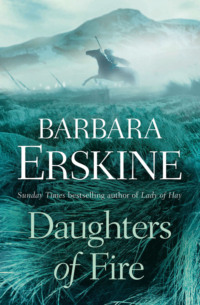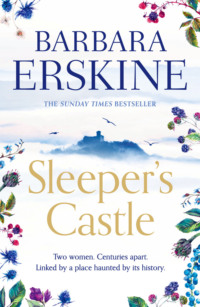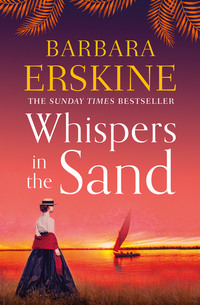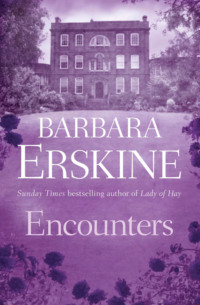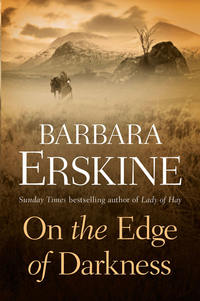
Полная версия
Sleeper’s Castle: An epic historical romance from the Sunday Times bestseller
‘Tad?’ she called. ‘Where are you?’ With another horrified glance at the page she turned to run back into the great hall. The front door of the house was standing open and, despite the heavy screens set up to keep it at bay, the large room was full of the wind. Sparks and ash flew in all directions from the fire. There was no sign of her father.
The garden was dark and reverberated with the noise from the trees beyond the high walls thrashing in the gale. As she stood on the step looking round she could see nothing. The sound of the brook hurtling down over the rocks vied with the wind and the trees to drown out any sound her father might make. She peered round desperately and then as her eyes grew used to the fitful starlight she thought she could see him, a darker shape against the shadows. She made her way cautiously down the path. He was indeed there, staring out across the cwm towards the mountains.
‘Tad?’ She came to a standstill beside him and timidly she reached out and touched the sleeve of his robe. He didn’t react. ‘Please, talk to me. I saw what you had written.’
He turned abruptly and stared blindly down at her. Her father was a tall man. She barely came up to his shoulder and he seemed to be looking out over the top of her head into the distance. ‘You saw nothing.’ His voice was dull and heavy. ‘Do you understand me, Catrin? You saw nothing at all.’
‘But, Tad—’
‘No!’ He seemed to awaken as though the dream of which he had written had slipped like a heavy burden from his shoulders. He straightened and stepped away from her. ‘It was nothing. It’s gone. I will burn the page. It was the result of an ague. Tell Joan her food is too rich. It lies on my stomach like a stone; make me something in your stillroom to settle it.’
She watched his dark shape as he strode back towards the house and disappeared through the door. It closed with a bang and she was left outside alone.
She drew her cloak round her. Her beloved father had been trembling. She had felt it in those few seconds as she touched his arm before he shrank away from her. He had been trembling not because he was cold but because he had been afraid.
Sleeper’s Castle had been her mother’s inheritance. She had been the only daughter of a wealthy well-connected local Welsh family – uchelwyr was the Welsh word for their class – and her grandfather had settled the old fortified manor house on her when she had married, with its farm and its supplement of servants. What he thought of her choice of an itinerant bard, albeit of impeccable descent, as a husband, Catrin never knew. Perhaps his decision to give them an isolated, ancient house hidden in the mountains and already the custodian of years of legend about its magical past and far from his own fertile acres in the Wye Valley, was a witness to his hidden thoughts. When Marged died in childbirth the house remained with Catrin’s father, who bit by bit had sold off what land it had until very little remained. What moneys they owed each year he paid from the earnings he brought home from his summer tours around the houses of his rich patrons.
Bards were popular. The people loved them and their visits were eagerly awaited. They were poets but they were so much more. As well as the genealogies of the principalities and the history of the land of Wales, the myths, the legends, the ancient stories, they also knew all the latest gossip. That had made them dangerous once, in the reign of King Edward I, passionate supporters of their princes as they were in their desperate battle for independence from England; and that could make them dangerous again. The bards sang and played the harp. But their business was words. Words are powerful; words can soothe or inflame. Words can inspire loyalty or treason. Words can incite revolt. Edward may have recognised their power and ordered their execution, but they had never been exterminated.
They toured the houses and castles of the land, staying a week here, a month there, eating at the table of anyone who would pay them with food and shelter. Some had no homes of their own, no roof save the roof under which they were staying. They owed their allegiance to the man who fed them. Thanks to his marriage, Catrin’s father was one of those who had a home and he had both a family and a bloodline of which he was intensely proud. But Dafydd was the most dangerous kind of bard of all. He was also a seer, a soothsayer; he saw the future in his dreams.
A succession of nurses and housekeepers had reared Catrin. They had mostly proved loyal and kind to their small charge, but when she was old enough her father dismissed them, taught her himself and left the running of the house to the few servants who were trusted with the remaining farm animals, their ponies, the vegetable gardens and the kitchen. Catrin did not seem to notice. She loved this place. It was in her blood. She did not know or care that her mother’s family had turned their back on her father and forgotten her.
This land in the border Marches of Wales was a place of beauty and magic and danger. Successive Marcher Lords, supported in their greed for land by their king, had built their great castles and made dangerous or at best uncomfortable neighbours to the local Welsh families over the centuries, but hidden away in this fold of the hills, cradled in the crooked elbow of a torrential brook and lulled by the cry of the birds, Sleeper’s Castle, Castell Cysgwr, had seemed safe to Catrin. Until now. For her father’s dreams of late had been frightening and full of ominous clouds.
She knew her father’s fathers had been bards and soothsayers from the days of the ancient Druids. Poetry was in his blood, the inheritance of his family, the gift of his ancestors. His name was Dafydd ap Hywell ap Gruffydd ap Rhodri – his line stretched back through time like a bright ribbon of silk. And there she was, Catrin ferch Dafydd, Catrin, the daughter of Dafydd, the latest born and perhaps the last of that line.
She didn’t remember her mother, Marged, but in her dreams, those dangerous sparkling dreams she never mentioned to her father, she could see her clearly, her eyes the colour of smoke, her face gentle and loving as she smiled at her little daughter, the daughter she had never met, the daughter who had inherited all her father’s talents and more.
Dafydd taught his daughter all he knew. She could read at the age of four; she could play the harp at the age of six; she could recite the long histories of her father’s family and their patrons and princes by the age of eight. She could write poems and stories of her own and at her father’s dictation, and from the age of twelve she had been sufficiently confident to sing to the harp in front of her father’s patrons. Once or twice, in the solar of an indulgent group of women, she had sung her own poems, cautiously diffident, embarrassed by their applause. The poems were a secret and even now she was a woman she had not confessed to her father that she wrote and dreamed just as he did. She sensed he would not approve. He was proud of his daughter’s talents but subtly and firmly he had made it clear he would not tolerate competition, especially not from a woman. Things might have been different had he had a son.
There were other secrets in her life. After her mother died, in his first frenzy of grief and anger, Dafydd had hidden or destroyed everything that would remind him of his beloved wife. When the nurse who was taking care of this new scrap of life had seen what was happening she had rescued the one thing Marged had treasured above all else and which the loyal woman was sure would end up in his vengeful pyre: a small coffer in which was stored Marged’s tiny, beautiful book of hours, another book of poetry and a collection of notes and recipes for herbs and cures and remedies, copied for her from the family of healers who lived in the village of Myddfai, on the banks of Llyn y Fan Fach on the far side of the mountains. Each successive nurse had been sworn to secrecy and promised to keep the coffer safe until Catrin was given charge of her mother’s legacy by the last of the women employed to look after her. Her father now felt she had no need of female company beyond the servants and cooks who remained. By then Catrin already knew this small coffer and its contents was something else she had to keep hidden.
Her second secret she had found for herself. Half a mile up the valley, through a wood and across a brook she had stumbled upon a small cottage, lost in a tangle of wild herbs. The widow who lived there, Efa, was motherly and kind, full of stories of her own. Catrin told no one of her friend. It seemed important that she should be as secret from her father as the coffer full of her mother’s treasures.
Woven into the stories Efa told were ancient legends and magic spells. Sometimes when Catrin climbed the bank towards the cottage she saw gifts which had been left outside, a skinned rabbit, a jar of cider, a pot of honey, and when she asked, Efa told her about the service she rendered to the community. She magicked the weather. It seemed natural for her to teach the wide-eyed child some of the simple spells. She knew where Catrin lived, she knew the stories about Sleeper’s Castle. She guessed the girl would have a natural aptitude, and so it proved.
The farmers who came to see Efa needed fair weather for ploughing and harvest, they needed rain and then sun for ripening the crops; their wives came to seek good weather for markets and fairs and festivals. And then for fun Efa showed her some of the more powerful magic, the magic that would command the elements, conjure thunder and lightning over the high tops of the mountains, rites which commanded the mist and fog to wrap itself around the trees and drift into the cwm. It was all secret. When men or women came and asked for lightning to strike a neighbour dead or for weather to cause their cattle to sicken and die, Efa refused. Such magic was black and a mortal sin, but she taught Catrin that it could be done and how. That was the greatest secret of all.
‘He has called for new candles.’ Joan looked up as Catrin walked into the kitchen from the garden next day. She was chopping onions and leeks and tossing them into the pot.
‘I’ll take them in to him.’
Joan straightened her back, tucking a wisp of her blonde hair under her hood. The house was full of the smell of her rich fish stew. ‘He’s not well. You must make him eat.’
Catrin nodded.
‘I heard him shouting again in the night.’ Joan held her gaze challengingly before looking away. She reached for a dishclout and wiped her hands.
‘I know. I know he’s worried.’ Catrin pulled a stool from under the table and sat down with a heavy sigh.
Her relationship with Joan was a difficult one. The two young women were of a similar age with but two years between them, and in the lonely valley with few neighbours they had become friends. But Joan was her servant; she was paid to cook and clean.
Joan’s father, Raymond of Hardwicke, was a wealthy yeoman farmer and such work should have been beneath her, but his farm had struggled to survive over the last decades like so many others after the last great wave of pestilence had swept across nations far and wide, destroying towns and villages, leaving land depopulated and barren. Raymond had two sons, the eldest had married and was slowly taking over the running of the farm; his second son had also married and had left home with the idea that he would one day take over part of his wife’s father’s land. Raymond’s only daughter, Joan, was expected to marry and marry equally well. But she had stubbornly refused every suitor her father picked for her. In the end, in a fit of vindictive spite, he told her to go and live off someone else’s charity. She did.
Working for Dafydd ap Hywell had a cachet all of its own – besides, he paid well. His patrons were generous and he had realised almost too late that if he dismissed every servant on the place he and Catrin would be left to cope alone. Joan liked it at Sleeper’s Castle. It had once been far grander, a fortified manor house in a scattered parish in the hills above Hay. Some of the walls had crumbled and it had little land left, but it still had a fine slate roof, Catrin was educated and her gowns had been made by a skilled seamstress. They were serviceable and these days Catrin patched them herself with neat clever stitches, but nevertheless they were of good expensive cloth, and her cloaks were warm and lined with miniver. Joan liked her and was sorry for her. She must be lonely. She needed a friend.
Joan glanced at Catrin, who was sitting at the table with her head in her hands. ‘He’s had these moods before,’ she said. Her voice was gentler now. ‘He’ll come out of it. You’ll see.’
Catrin looked up. ‘I know.’ Wearily she stood up. ‘I’ll go and see if he wants to eat. Perhaps if you throw more logs on the fire in the parlour and serve us there it will cheer him up.’ She didn’t notice Joan’s tightened lips or her exaggerated sigh. Usually they all ate together in the great hall, or she ate here in the kitchen with Joan and Betsi and Peter after placing her father’s food on a tray and taking it to him in his study. That was the way he liked it.
It was as she left the kitchen and walked back into the shadowy hall she thought she caught sight of a woman’s figure standing near the window. Behind her the kitchen door banged and the draught sent a wave of cold air across the room, scattering ash, blowing out the candles. She blinked and stared and rubbed her eyes and the figure had gone.
Andy woke with a start. The morning sun was shining into the room and she lay quietly staring at its path across the black-painted floorboards. She had been dreaming, a gentle homely dream about cooking and putting logs on the fire downstairs, and then in the dream a door had banged and all the candles had blown out, leaving her in darkness. She had woken, aware that somewhere a conversation had been left unfinished, the words still echoing in the quiet of the room.
Sitting up, she groped for her slippers with her feet and pulled on her dressing gown. Pushing her hair back off her face she made her way downstairs to the living room. The bang of the door slamming shut in her dream had seemed so loud and so real it was as if it had been in here.
The room looked huge and shadowy at this time of the morning, living up to its title of great hall. She smiled, remembering that was the way Sue referred to it, her only concession to the house’s medieval antecedents.
The sun hadn’t come round yet to any of the windows. The papers on Sue’s desk by the front-facing window with its ancient mullions had been blown onto the floor. Had that happened last night when she came in? She couldn’t remember. She gathered up the papers and as she did so she noticed two tightly stoppered bottles of dark brown liquid standing there. Tucked under them was a torn sheet of paper which said simply: For Sian.
Neither she nor Sian had thought to look on Sue’s cluttered desk the night before. Andy surveyed the chaos with a smile. If she had been going away for a year she felt sure she would have tidied her desk at the very least. She groped in her pocket for her phone and turned back to the kitchen to look for the note on which Sian had written her number.
‘You don’t look as though you slept much.’
They had arranged to meet in The Granary in Hay. Sian’s dogs lay quietly under the table as Andy brought the two cups of coffee from the counter and set them down.
Andy gave a rueful grin. ‘I suppose I didn’t. I was exhausted, but my head was whirling all night. The silence is so different from London.’
She must have slept though. After all, she had dreamed.
‘Silence? Didn’t you hear the brook?’
‘It is a bit noisy, I admit, but it’s not cars and planes. My house – where I used to live,’ Andy amended hastily, ‘was under the flight path to Heathrow.’
‘Ah.’ Sian took a sip from her cappuccino and licked the froth from her top lip. ‘Not in the same league, noise wise.’
‘There are people who use the sound of water to send them to sleep,’ Andy smiled again, ‘but this is a constant roar. Not all that soothing. I’m sure I’ll get used to it though.’
‘I think you will soon find it wonderful in comparison to the early morning jet to New York.’ Sian laughed. She watched as Andy rummaged in her shopping bag for the bottles she had found in the house.
Sian reached for one; unscrewing it, she sniffed the liquid and grimaced. ‘As far as I can tell, that’s the right one. Rosehips and nettles with burdock, plus one or two other secret ingredients no doubt. To build them up before the winter.’
Andy looked down at the dogs under the table. ‘They look pretty fit to me.’
‘They are. Thanks to Sue.’ Sian sipped her coffee again. ‘Was Bryn there this morning?’ She reached down and scratched a dog’s ear.
‘Bryn?’
‘The gardener.’
‘I didn’t see anyone.’
‘I expect he will come when he’s good and ready.’ Sian looked at her thoughtfully. ‘Remember, a lot of Sue’s herbs are what you probably call weeds. Don’t go rooting about without checking with him first.’
‘I’m not going to touch the garden.’ Andy picked up her spoon and stirred her coffee. ‘That was part of the agreement. I’m in charge of the cat and keeping an eye on the house, that’s all.’
‘So, what are you going to do up there all day on your own?’ There was a long pause. ‘Sorry. None of my business.’
‘No. It’s not that.’ Andy sighed. ‘The truth is, I haven’t really thought. I’m a professional illustrator. I specialise in painting flowers, so I suppose I will go back to doing that.’
Go back.
It made it sound as though she had stopped.
But she had. She had worked with Graham for years. They had been a partnership in so many ways, kindred spirits, lovers, flower geeks. She smiled quietly as she recalled the term given to them by one of her half-brothers.
And now all that had gone.
Sian reached over and touched her hand. ‘Sorry. I can see I’m treading on painful ground.’
Andy took a gulp of coffee. ‘I have to get used to it.’ She took a deep breath. ‘I illustrated the books my partner wrote. He died two months ago. That part of my life is over and I have to rethink myself. I thought …’ She paused. ‘Sue thought coming here would be a good way of doing that, and I agreed with her.’
‘It will. A complete change of scene is the best possible medicine.’
Andy laughed. ‘Painting nettles and burdock would be a tonic on its own. I was painting rare orchids for Graham’s last book.’
A woman at the next table stood up and began to manoeuvre her child’s buggy out of the narrow corner. Andy and Sian grabbed for their table as their coffee cups rocked and slopped into the saucers. They waited in silence for the woman to extricate herself and then settled back down. ‘You’d think she would have apologised,’ Sian said quietly. She poured her coffee back into the cup from the brimming saucer.
Andy was chewing her lip. Babies were another thing to tug the heartstrings. Graham had not wanted any. She did not even have a child to comfort her in her loss.
Sian accompanied her back to the car park then waved goodbye. She had walked down to Hay from her house and firmly refused the offer of a lift back. ‘Good for me and the dogs to walk.’ She smiled. ‘I’ll ring you. You must come to supper soon.’
For a few minutes Andy stood staring wistfully after the retreating figure as Sian set off across the car park, through a gate in the far corner and into the field behind it, her dogs racing round her in delight as soon as she let them off their leads. Andy watched until she had vanished through a hedge on the far side of the field then she turned back to unlock her car.
There was an old mud-splashed Peugeot van parked in her spot outside the house. She edged her own car in beside it and ran up the steps to the front door. Letting herself in she glanced round. Presumably the mysterious gardener had at last put in an appearance and she wasn’t sure if he had a key. There was no sign of him indoors however. Nor could she see him from the kitchen window.
He was digging in a bed at the far end of the garden. She watched him for several minutes before approaching him, aware that Pepper was sitting on the path near him, apparently intent on studying his digging technique. About six feet away from him she stopped. He went on digging, seemingly unaware of her presence. Losing patience she cleared her throat. ‘Bryn, I presume?’
He paused in his work then, thrusting the fork into the ground, turned to face her. He was tall, his hair an unruly tangle, his eyes clear light grey, almost silver, his face weathered. Over a dark plaid shirt he wore a leather waistcoat. He didn’t smile nor did he say anything. He surveyed her in silence, presumably waiting for her to speak again. Determined not to be wrong-footed, Andy narrowed her eyes. ‘You are Bryn?’ she repeated firmly.
He pushed his sleeves up to the elbow, revealing muscular arms, one of which bore a small tattoo. She couldn’t see what it was from where she was standing. He nodded in answer to her question. ‘I’m Andy Dysart,’ she went on. ‘I presume Sue told you I was coming to stay here for a few months.’
‘A year, she said.’ His voice was strong with a slight lilt.
‘A year,’ she confirmed.
‘She left me instructions on how to run the garden,’ he said. ‘I won’t need to bother you.’
‘Would you like to come in and have a cup of tea while we talk about how it is going to work?’ From his expression she could already guess his answer and as she expected he declined.
‘I have a flask, thank you. As I said, I won’t need to bother you.’ And with that he turned away. He pulled the fork out of the ground, and swinging it over his shoulder he walked off towards what looked like an orchard on the far side of the herb beds.
Andy glanced at Pepper, who was looking inscrutable. ‘So, that went well,’ she said out loud. The cat raised a paw and cursorily swept it over his ear. ‘You’re right,’ she added. ‘My fault for even starting the conversation.’
Heading back towards the kitchen she let herself in and pulled off her jacket. If she had been looking for the occasional chat to relieve the solitude of this house she would not find it in Bryn, whose second name she didn’t even know and whose timetable she would no doubt find out by seeing which days he turned up. She felt a flash of irritation.
She spent the afternoon unpacking. Tidying the desk and putting all Sue’s papers in a drawer out of sight, she surveyed the empty space with satisfaction before turning to lay out her paints and brushes and sketchbooks on the large table. It was a gesture to stake her claim on the house, she realised, as she lovingly touched the tools of her trade. Up to now she had not been able to bear even the sight of them; somehow she had felt she could never paint again without Graham’s encouragement, his compliments, his quiet certainty in her skill but seeing them lying there on an unaccustomed surface in a different setting, she felt the lure of the paint again. When the time came her brushes would feel right in her hands once more.
Leaving them in place, ready for action, she turned away and began a tour of the house, slowly visiting every room, reminding herself of her previous visit with Graham. The house hadn’t changed since that summer, except for the wonderful cat-inspired kitchen. The great hall downstairs was large, the walls of whitewashed stone, the ceiling white-painted between old rugged beams. The kitchen led off it in the far left-hand corner, while to the right were two smaller rooms, one of which was laid out as a dining room overlooking the front garden. It felt unused and slightly damp. Behind it was what Sue called the parlour, a small living room with its own inglenook fireplace, also unused. In the far right-hand corner of the main living room in the alcove beside the hearth, the broad stone-built staircase climbed to the first floor behind the huge chimney, a heavy rope doing the job of a banister. Upstairs, to the right, above the parlour were two bedrooms, one of which she had claimed as her own, and to the left was the much bigger room which was Sue’s – Pepper’s, she corrected herself – and the modern bathroom. At the opposite side of the landing were two more bedrooms. She lugged her remaining bags and boxes into one of those spare rooms. She would unpack the rest of her stuff as and when and if she needed it. As she closed the door on it all, her phone rang.


